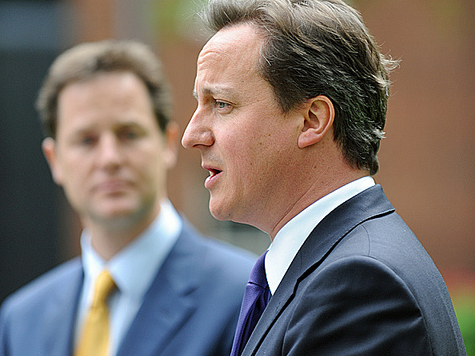
David Cameron has let it be known to the sympathetic media that “he’s very clear, he doesn’t want to another Coalition” come the next parliamentary term.
Just how seriously should we take this claim?
About as seriously as we would have taken it had he expressed a “very clear” desire for the Ukraine to be fully independent, democratic and stable next year, or a “very clear” desire not to cede any more power to the European Union, or a “very clear” desire never once ever again in his life to tread in a fresh dogpoo.
In other words, not seriously at all. It’s a wish, tossed casually into the ether like a penny down a well, not a sign of a bolder, more resolute Cameron who has finally made up his mind to put some “clear blue water” between himself and the opposition and campaign on an unembarrassedly Conservative ticket.
Here are just three recent examples which show the Conservatives still aren’t remotely closer to understanding what conservatism really means:
1. Cameron’s recent declaration that “money is no object” in dealing with the floods. As Ryan Bourne notes at City AM:
This may have been politically appealing, but this sort of linguisticsloppiness does much to undermine the government’s fiscally responsiblemessage. If money is limitless in dealing with floods, why not inprovision of benefits or the NHS? Cameron’s statement implies that thereis no constraint on the government spending taxpayers’ money, but italso ignores a concept which economists call “opportunity cost” – whenwe spend money, we forego spending it on alternatives.
2. Chancellor George Osborne’s declaration that “We should be there with a cheque book to help Ukraine”.
Should we? Why? Where’s the national interest? Where are our historical ties to the region? How is it in our geopolitical or economic interests to get into a bidding war (or worse) with Putin’s Russia?
3. Education Secretary Michael Gove’s suggestion that the “holiday industry” should resist the temptation to raise prices during the school holidays.
I like Michael Gove and respect much of what he does and says. But this line of his is well out of order and opposes one of the most basic principle of free market capitalism: supply and demand. If more punters wish to fly during the school holidays, then clearly spaces on aircraft and in hotels will become scarcer and consequently more valuable. It is not the business of government emotionally to blackmail businesses in the travel sector by suggesting that they should forego profits in the interest of our kiddies’ education. Why should that be the travel industry’s problem?
As the 2015 General Election draws closer, the Conservative party is growing understandably desperate to find a message that will help it gain the 40 per cent plus of the vote it needs if it’s to win a workable majority in the next parliamentary term.
Just how desperate can be seen elsewhere in its flailing attempt today to rebrand the Conservatives “the Worker’s party.”
If this was “Workers” in the sense of “people who actually work for a living”, I don’t think many of us would have any problem with that.
But it will, I fear, take more than a closed-session speech by Grant Shapps here and a vague piece of wishful thinking by the Prime Minister there to change what many of us think about the current Conservative party: that it’s untrustworthy, ideologically spineless, and run mainly in the interests of an ugly cabal of rent-seeking corporatists, property developers, bankers and quangocrats, all of them utterly out of touch with the needs of the decent, hardworking, aspirational types who have traditionally constituted the Conservatives core voting base.
Until that changes, why on earth do they think they deserve our vote?

COMMENTS
Please let us know if you're having issues with commenting.